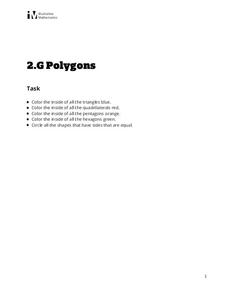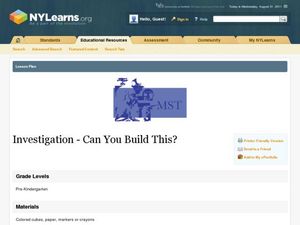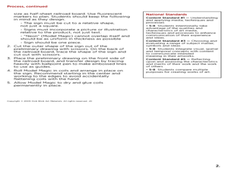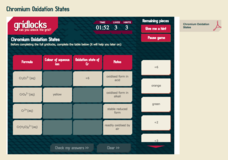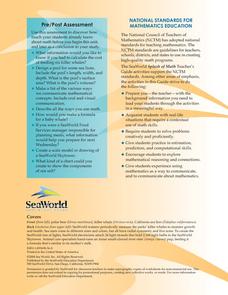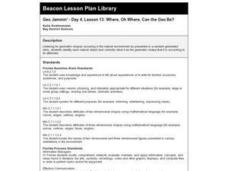Curated OER
Fish Math
Students recognize things that are the same and things that are different. They use shape, size, numbers and color, for recognition. They make fish with different shapes/colors on them and 'fish' for the kind of fish that displays the...
Curated OER
How Volcanoes Grow
Young scholars build models of the three major types of volcanoes and see how a volcano's shape is related to the type of material it erupts. As a class, they observe a demonstration that simulates the nature of two volcanic materials:...
Curated OER
How Volcanoes Grow
Learners create models of the three major types of volcanoes and determine how a volcano's shape is related to the type of material erupted. They then observe a demonstration that simulates the nature of two volcanic materials: lava and...
Curated OER
Nature Art
In this nature art lesson, students take a nature walk and collect items with different sizes, textures and colors. Students use the items they collect to make a collage.
Illustrative Mathematics
Polygons
Identify shapes based on their attributes. Second graders are tasked to color triangles, quadrilaterals, pentagons, and hexagons specific colors. The one thing these shapes have in common? They are all polygons.
Curated OER
Investigation--Can You Build This?
Early learners explore shapes using colored blocks. They first get some hands-on time with the blocks and then look at beginning math concepts regarding spatial relationships. They work with a partner to build a 6-8 block tower with...
Berkshire Museum
Camouflage!: Collecting Data and Concealing Color
Help young scholars see the important role camouflage plays in the survival of animals with a fun science lesson. Starting with an outdoor activity, children take on the role of hungry birds as they search for worms represented by...
NOAA
Make an Edible Coral Reef
Coral reefs are full of an abundance of life and color. Why not celebrate it with an edible coral reef? Learners and teachers alike use cake, icing, and candies to create a tasty version of a coral reef that's complete with colors,...
WakeGOV
Plastic Sight Words
Plastic math? Have young learners count and name the number of plastic items in their centers. Kindergartners match sight word cards to the number of plastics in a given group, while learning that plastics come in all different shapes,...
Curated OER
Neon Signs
Middle schoolers study a commercial art form and explore its historic and social meaning. They apply linear color to a shape, bending and forming the lines in much the same way a sign artist would form glass tubing. They design their own...
Curated OER
Making Models of the Solar System
Learners make several models of the solar system to learn the positions of the planets in the solar system as well as relative distances and sizes. Creation of these models will help them identify the planets by size, shape, color,...
Hawaiʻi State Department of Education
Color Moods
Can art be a mode of communication? You bet it can! Learners explore how colors are used to convey mood in art. First, the class listens to three very unique musical selections that convey three different moods. Then, they compare and...
Royal Society of Chemistry
Chromium Oxidation States
Colorful chromium is captivating! Science sleuths solve a series of puzzles using an interactive resource. Individuals relate the oxidation states of chromium to the colors produced when the compound is placed in acidic or basic solutions.
Curated OER
Understanding Symmetry Through Visual Art
Have your class explore symmetry, radial balance and fractional parts in natural and man-made objects in their environment. Learners list examples and identify symmetrical and asymmetrical designs. Pupils are given a box of crayons and...
Curated OER
Just Plain Buggy: Art and Science
Budding artists explore the shapes and parts that make insects so fascinating to study, then use what they see to create original insect inspired designs. They use wax, dye, and fabric to create their designs.
Curated OER
Paper Clay Leaves
Using real leaves to imprint clay, your class will see a natural effect on their individual projects. This is a fabulous way to study leaf anatomy in science. Or, you can focus on mixing colors to recreate the original. These leaves can...
Curated OER
Towers and Turrets
A instructional activity on architecture will help young artists consider perspective. Your class will use water colors to paint towers and turrets. You can connect this art instructional activity to famous buildings like the Taj Majal...
Curated OER
Papier-Mâché Globe
Paper mache projects are great for using up paper from the recycle bin. Give your class the chance to create a three-dimensional globe out of paper mache. They'll work to make their globes as accurate as possible, adding proper colors...
Sea World
Splash of Math
How can kids use math to learn about marine life? Combine math skills with science lessons in a resource featuring activities about life in the sea. Kids graph and calculate data, solve complex word problems, measure geometric shapes,...
Curated OER
Arti'stick Mobile
Young scholars examine works of stained glass in one dimensional art form then adapt it a three dimensional transparent mobile. They create their mobile using patterns of shapes and simple images from computer line art, printed art books...
Curated OER
Make-Your-Own Math Practice
Young scholars create their own math practice book. In these homemade book lessons, students create their own counting, number, and shape pages. When the pages are complete, they are bound together in a book.
Curated OER
Blotter Bugs
Students work with primary colors. They choose two primary colors, then put two drops of each color they chose on a white square paper. They fold the white paper in half and rub the paint around.
Curated OER
When You're Hot, You're Hot...
Students use the medium of visual arts to demonstrate how colors can evoke different ideas and feelings.
Curated OER
Geo Jammin' - Day 4, Lesson 13: Where, Oh Where, Can the Geo Be?
Students listen to a story "My Crazy Dream" with an intent to identify shapes in ordinary objects. They raise their hands when they've heard an object whose shape they can identify. They discuss their findings.






